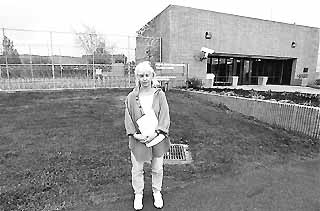https://www.austinchronicle.com/news/1998-12-18/520838/
Against All Odds
By Robert Bryce, December 18, 1998, News
|
|
Imagine you are a lawyer.Your client is in jail. You want to get your client out but you can't determine his status without reading his file. But to get that file, you must file a Freedom of Information Act request. And even then there's no guarantee the agency will release the file. Imagine further that your client is coming up for a hearing — a hearing that could allow him to be freed. The agency sets the hearing for 2:30pm on a given day, but when you call the agency the morning of the hearing to confirm the hearing, you're told the time of the hearing has been changed to 9am. By that time, it's too late for you to make the hearing. It's also too late for your client's wife to attend. She had planned to testify on behalf of your client and had driven all the way from Dallas to make the hearing. But alas, she, too, arrived too late.
Too little, too late, or not at all. Those are burdens that must willingly be accepted by a lawyer working on behalf of INS detainees. Those hassles would likely send any other lawyer off the deep end. But D'Ann Johnson just can't quit. As Austin's most prominent advocate for Immigration and Naturalization Service detainees being held in Texas jails, Johnson spends virtually all of her free time traveling to jails, meeting with INS detainees, or lobbying INS officials on behalf of her clients. And she does it all for free. Her state job pays the bills, including the phone bills she racks up calling the INS on behalf of her clients.
An attractive, energetic woman with piercing blue eyes and a quick laugh, Johnson, 44, has a passion for her cause, and she has few illusions about her work. Instead, she is driven by a quiet rage at the INS bureaucracy, a bureaucracy that would repel anyone with less moxie. Johnson would never describe her motivation as rage, but that word certainly seems to be apt. After all, the conditions outlined above are all true. In May, she filed 20 FOIA requests on behalf of INS detainees held in Texas jails. By October, the INS had provided her with just three files. Last March, when she planned to go to a hearing for one of her clients who was being held at the Bastrop County Jail, the time of the hearing was changed at the last moment, forcing her to miss the hearing. In October, three of her clients were moved by the INS, without explanation, from Bastrop to a prison in Talladega, Alabama; Johnson was told of the move only after the clients had been removed. Once they arrived in Talladega, one of her clients was mistakenly put in a high security cell where he was kept for 23 hours a day. "They made me cry when they took Luis Terry [one of her clients who was moved to Alabama]," says Johnson, who calls the INS's system of handling prisoners "very offensive."
A former schoolteacher, Johnson decided at age 30 to go to law school even though she was a single parent with two children under the age of six. In explaining her passion for taking up difficult legal cases, Johnson says, "I've always taken up these kinds of causes. When I was in grade school, I organized kids in my sixth grade class to adopt a kid through the Children's Rights Fund. We donated $2 a month and sponsored a kid on a Cherokee Indian reservation."
A board member of the Political Asylum Project of Austin, a 10-year-old group that provides immigration services to low-income people, Johnson also recruits other lawyers to help represent INS detainees. Additionally, she recruits volunteer attorneys through her membership on the board of the National Lawyers Guild. And of course, she recruits journalists to write about her clients. In one case, when a journalist asked the INS for permission to interview one of Johnson's clients, a Cuban being held in Bastrop who had been cleared for release eight months earlier but had still not been released, the INS let the man go before the journalist could conduct the interview.
Raised as a Presbyterian in her home state of Wyoming, Johnson has since become a Quaker and now belongs to the Friends Meeting of Austin. "I think I'm a Quaker because of my passion for these kinds of things," she explained. "It's a pacifist church. The fact that they really stress commitment to other people is what attracts me."
Johnson describes herself as "a stubborn sort." But there also is a warm-hearted humanity that gives the lie to every lawyer joke ever told. In her office, she shows a visitor the small gifts that her clients send her. They don't have any money, so they send her elaborately braided crosses and small, brightly colored lariats that they have woven in their jail cells. As she gently slides the weavings back into the beautifully stenciled envelopes that her clients have colored for her, it becomes clear that Johnson values the little baubles as much as she would diamonds or gold.
The reason for her dedication to the cause is simple, direct. "We have an obligation to do things for people. We just have an obligation."
The Political Asylum Project is accepting donations, particularly Spanish-language books and magazines, and collecting Christmas cards to be sent to prisoners. For more information, call PAPA at 478-0546.
Copyright © 2024 Austin Chronicle Corporation. All rights reserved.

